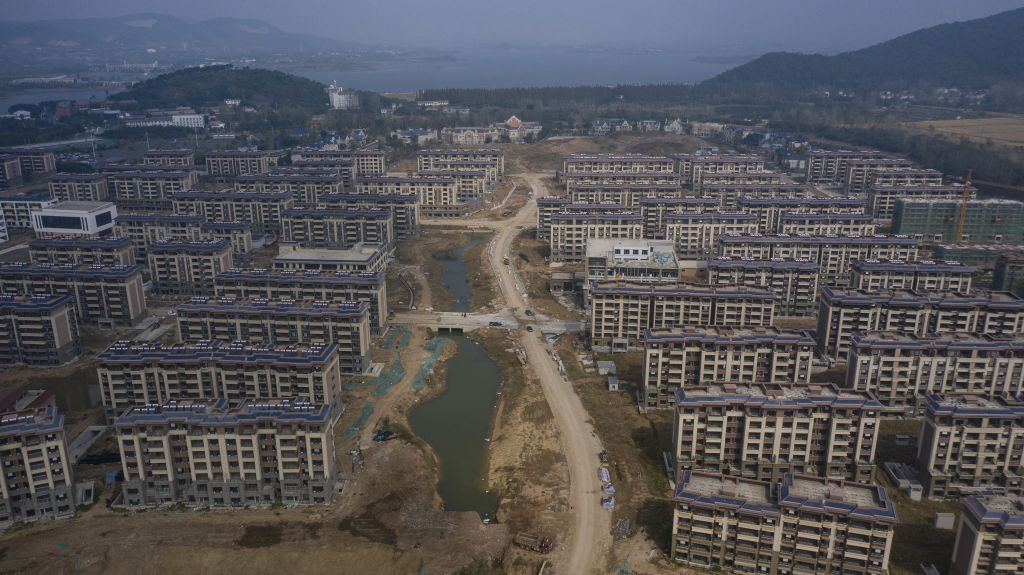Evergrande was just the beginning. China's property sector is in trouble.
It's not clear that Xi Jingping's government has the tools to fix the problem


A free daily email with the biggest news stories of the day – and the best features from TheWeek.com
You are now subscribed
Your newsletter sign-up was successful
China’s long-running property sector crisis is somehow getting worse. CNN reported that Evergrande, the giant developer whose 2021 default set off the crisis, is unable to complete its debt restructuring plan thanks to an investigation into one of its subsidiaries. The result of that announcement? On Monday, Evergrande’s stock plunged 21% in Hong Kong stock trading — “dragging down the stocks of other Chinese property developers” and deepening an economic mess that has shaken China’s already fragile economy.
Evergrande and companies like it were “once a booming industry and a key driver of the country's economic growth,” Reuters reported. But Evergrande isn’t the only Chinese developer struggling with a huge debt load: Country Garden Holdings, which has 108.7 billion yuan (more than $14 billion in U.S. dollars) in bond repayments due over the next year, has also signaled that it is at risk of default. The compounding crises could “delay the prospect of a recovery of both the property market and the broader Chinese economy.”
Indeed, Bloomberg argued, the latest headlines from China’s property sector have “undercut Xi Jinping’s push” to end the economic malaise overtaking his country. Xi’s government has taken “measures to prop up housing demand” — including loosening of mortgage restrictions — in the hopes of keeping the industry afloat, but “China’s aging population and an oversupply of housing” may mean there’s only so much officials can do.
The Week
Escape your echo chamber. Get the facts behind the news, plus analysis from multiple perspectives.

Sign up for The Week's Free Newsletters
From our morning news briefing to a weekly Good News Newsletter, get the best of The Week delivered directly to your inbox.
From our morning news briefing to a weekly Good News Newsletter, get the best of The Week delivered directly to your inbox.
'Companies have pulled back'
The problems of big developers are hurting the little guys in China, The New York Times reported. “Small businesses and workers are owed hundreds of billions of dollars” for completed work, and new development projects are no longer in the pipeline. That has rippled through the rest of the economy. “Companies have pulled back on hiring. Fewer and fewer people are buying homes.”
Will China’s problems spread to the West? Maybe not. “The reality is that the world is now a little less exposed to China than it used to be even a few years ago,” Cornell University’s Eswar Prasad said in an interview with The New Yorker. A Chinese stock market crash might not have a “huge negative effect” on American stocks. It’s true that “commodity-exporting countries, oil-exporting countries” might be hurt by the faltering Chinese economy, but “U.S. exports to China are limited” which means that Americans should mostly avoid “the dampening effect” of the property crisis.
The effects aren’t just economic. Business Insider pointed out that President Biden believes the property crisis reduces the possibility of a China-U.S. conflict over Taiwan. "He has his hands full right now," Biden said of Xi earlier this month. Xi’s efforts to spur his country’s economy are faltering, and some observers fear that means China might ratchet up its designs on Taiwan. Biden disagrees. "I don't think it's going to cause China to invade Taiwan,” Biden said. “Matter of fact the opposite, [the country] probably doesn't have the same capacity as it had before.”
'A decade's work in front of us'
The struggle continues. South China Morning Post reported that Moody’s Investors Service has downgraded its analysis of the country’s property sector from “stable” to “negative.” That news “only increases the likelihood of more forceful and broad-based policy support” from Xi’s government in the coming months. But that stimulus will probably only stabilize the sector, not revive it. “A major stimulus-fueled rebound in China’s housing market is highly unlikely.”
A free daily email with the biggest news stories of the day – and the best features from TheWeek.com
So how long will it take to pull out of the crisis? Possibly a long time. “Fixing the property sector may be a multi-year or even a decade’s work in front of us,” economist Hao Hong told CNBC. One of the obstacles: The Chinese housing market is already vastly overbuilt — there are more homes and apartments available than people to fill them. “There is now an oversupply of real estate ... 1.4 billion people may not be able to live in them,” a former official said recently. Even with loosened mortgage rules, Chinese homebuyers probably won’t be able to save their country’s economy.
Joel Mathis is a writer with 30 years of newspaper and online journalism experience. His work also regularly appears in National Geographic and The Kansas City Star. His awards include best online commentary at the Online News Association and (twice) at the City and Regional Magazine Association.
